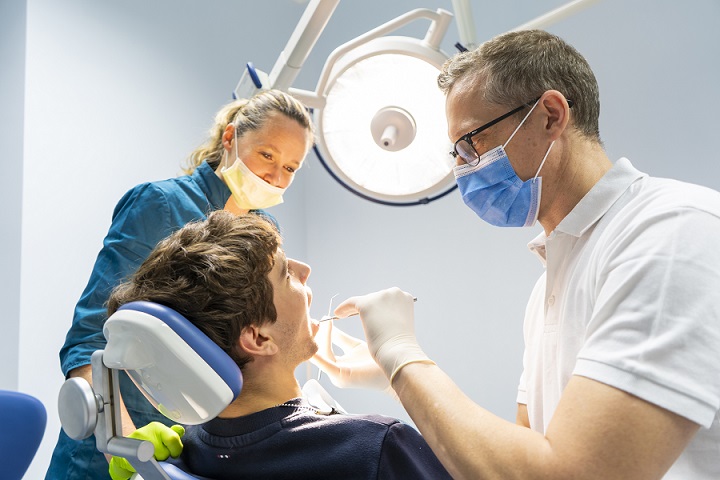As the United States and most of the rest of the world gets acclimated to a new normal in the coronavirus era, many people are left questioning what services are deemed essential and, therefore, still available to them. While grocery stores, hospitals, law enforcement agencies, public works and even liquor stores make the list, other services such as dental care straddle the line between elective and urgent. The trick is knowing which is which and how to stay safe if you have dental care needs that just can’t wait.
On April 1, the American Dental Association (ADA) recommended that dentists should keep their offices closed to everyone except those with emergencies until at least April 30. Their decision serves a number of purposes beyond simply cutting down on the transmission of coronavirus, however. Having dentists on the sidelines for everything except the most urgent cases reduces the need for personal protective equipment (PPE), such as gloves, masks and gowns, which is crucial to healthcare professionals on the front lines of the epidemic.
As a result, many shuttered dentists offices are donating their quantities of protective equipment to hospitals that are experiencing severe shortages. It is important, however, for dental offices to continue to provide emergency care because it also prevents people with dental problems from going to hospital emergency rooms that are already flooded with covid-19 patients.
Why Did the ADA Issue Their Recommendation?
By remaining open, dental offices could in effect become breeding grounds for coronavirus. Because the virus that causes covid-19 is spread through through the air when you sneeze or cough, another person can easily become infected by inhaling these respiratory droplets. In addition, the virus also lurks within the saliva and mucus in your throat and mouth.
Naturally, dentists come in contact with these types of fluids all the time. Some dental tools could even spray these droplets around the room. Unfortunately, most dentist offices aren’t equipped for the levels of protection necessary to keep the virus in check. For instance, they don’t usually work with N95 face masks or have areas common to hospitals such as isolation rooms.
What Qualifies as Emergency Dental Care?
As a helpful guide, the ADA provides a full list of dental emergencies. In addition to any life-threatening conditions, it includes anything involving severe pain, infection or uncontrolled bleeding. For example, any swelling or abscess as well as biopsies and post-surgical treatments are all considered urgent.
People need to know that their first step is to call their dentist to assess the problem. He or she will be able to answer your questions. Over the phone, a dentist can walk through strategies and suggest possible next steps. The main thing to know is to keep in mind that the ER should never be your first stop if a dentist is available.
What Treatments Are Not Urgent?
Treatment that doesn’t impact your health at the moment isn’t an emergency. Essentially, anything that you can reschedule such as teeth cleaning, x-rays, whitening or other cosmetic fixes are considered elective and should be postponed until later.
A Boom in Teledentistry
In order to stem the tide of people seeking emergency dental care at hospitals, some dentists are steering their patients toward teledentistry. Although the idea of evaluating patients virtually has been around for a few years, the concept has taken off in the wake of the coronavirus pandemic. As a result, many dental offices are rushing to get up to speed. With photos or video, a dentist can offer a diagnosis and recommend a course of treatment. Using modern technology, people can still get the care they need without placing extra burden on the nation’s hospitals.
The crucial piece of the puzzle for anyone needing dental care during the coronavirus crisis is to take advantage of all resources available from your dentist before heading to the ER. By contacting a dentist initially and allowing them to triage the problem, you will ensure that our health system’s precious resources are directed to the most urgent cases at a time when it can ill afford to waste such things.




